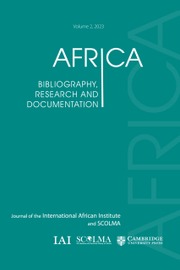No CrossRef data available.
Article contents
Hans Zell: bibliographer of African publishing – introduction
Published online by Cambridge University Press: 31 March 2025
Abstract
An abstract is not available for this content so a preview has been provided. Please use the Get access link above for information on how to access this content.
Information
- Type
- Hans Zell Festschrift: sixty years of service to African scholarship
- Information
- Copyright
- © The Author(s), 2025. Published by Cambridge University Press on behalf of the International African Institute
References
Ail, A., Jay, M. and Kitchen, S. (2024) ‘The African Books Collective: a conversation across three generations’, Logos 35 (2–3): 83–90.Google Scholar
Davis, C. (2020) African Literature and the CIA: networks of authorship and publishing. Cambridge: Cambridge University Press.Google Scholar
de Jong, F., and Valente-Quinn, B. (2018) ‘Infrastructures of utopia: ruination and regeneration of the African future’, Africa, 88 (2) 332–51.CrossRefGoogle Scholar
de Waal, A. (1997) Famine Crimes: politics and the disaster relief in industry in Africa. Oxford: James Currey.Google Scholar
Gedin, P. (1991) ‘Private enterprise publishing in Africa: why and how it should be fostered’, Logos 2 (3): 133–9.CrossRefGoogle Scholar
Hanafi, S. and Arvanitis, R. (2016) Knowledge Production in the Arab World: the impossible promise. Abingdon: Routledge.Google Scholar
Hill, A. (1992) ‘British publishers’ constructive contribution to African literature’, Logos 3 (1): 45–52.CrossRefGoogle Scholar
Kamau, K. and Mitambo, K. (2016) Coming of Age: studies in African publishing. Nairobi: East African Educational Publishers.Google Scholar
Kilolo, M. (2022) ‘Empowering African languages through publishing: whose responsibility?’, Africa Bibliography, Research and Documentation 1: 3–11.CrossRefGoogle Scholar
Kitchen, S. and Mills, D. (2024) ‘African journal publishing needs funding and infrastructure to survive’, Africa at LSE, 4 December. https://blogs.lse.ac.uk/africaatlse/2024/12/04/african-journal-publishing-needs-funding-and-infrastructure-to-survive/
Google Scholar
Kitchen, S., Mills, D. and Ba, P. (2024) ‘Afrostructuring: why we need an African future for African research publishing’, LSE Impact Blog, 31 October. https://blogs.lse.ac.uk/impactofsocialsciences/2024/10/31/afrostructuring-why-we-need-an-african-future-for-african-research-publishing/
Google Scholar
Larby, P. M. (1977) ‘Progress in African bibliography’, African Affairs 76 (304): 432–4.CrossRefGoogle Scholar
Limb, P. (2024) ‘Nigerian journals, publishers, and libraries: a response to Hans Zell’, Africa Bibliography, Research and Documentation 3: 57–64.CrossRefGoogle Scholar
McIlwaine, J. (1993) Africa: a guide to reference material. Oxford: Hans Zell Publishers.Google Scholar
Mills, D., Kitchen, S. and Sidi-Hida, B. (2024) ‘African journal publishing: infrastructures, visibility, resilience’, Global Africa 7.Google Scholar
Nyamnjoh, F. (2007), ‘Cultures, conflict, and globalization: Africa’ in Anheier, H. K. and Raj Isar, Y. (eds) Conflicts and Tensions. London: Sage.Google Scholar
Odinkalu, C. and Sambu, C. (2024) ‘“A robbery on so large a scale”: 140 years after the Berlin West Africa Conference’, African Arguments, 19 November. https://africanarguments.org/2024/11/a-robbery-on-so-large-a-scale-140-years-after-the-berlin-west-africa-conference/
Google Scholar
Oluwasanmi, E., McLean, E. and Zell, H. (eds) (1975) Publishing in Africa in the Seventies. Ife: University of Ife Press.Google Scholar
Park, E. et al. (2021) ‘Intellectual and cultural work in times of austerity: Introduction’, Africa 91 (4): 517–31.CrossRefGoogle Scholar
Zell, H. M. (2008) ‘Publishing in Africa: where are we now? Part One: some spurious claims debunked’, Logos 19 (4): 187–95.CrossRefGoogle Scholar
Zell, H. M. (2009) ‘Publishing in Africa: where are we now? Part Two: accomplishments and failures’, Logos 20 (1–4): 79–90.CrossRefGoogle Scholar
Zell, H. M. (2021) ‘Women in African publishing and the book trade: a series of profiles’ [Series I], African Book Publishing Record 47 (1): 8–43.CrossRefGoogle Scholar
Zell, H. M. (2022) ‘Women in African publishing and the book trade: a series of profiles – Series II’, African Book Publishing Record 48 (2): 112–53.CrossRefGoogle Scholar
Zell, H. M. (2024a) ‘“Action plans’ to support the African book industries: current initiatives in progress, and an inventory of earlier projects’, African Book Publishing Record 50 (4): 312–21.CrossRefGoogle Scholar
Zell, H. M. (2024b) ‘Henry Chakava: an annotated bibliography’, Africa Bibliography, Research and Documentation 3: 65–79.CrossRefGoogle Scholar

